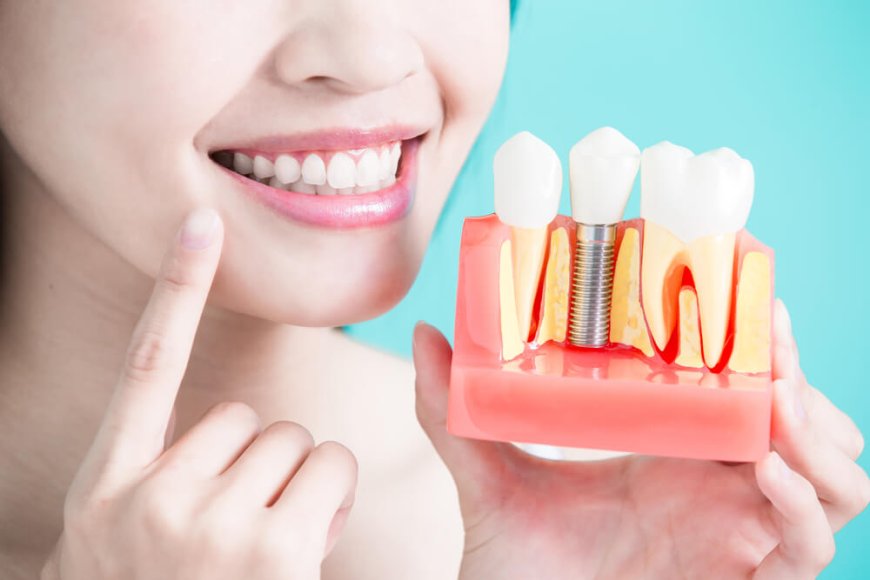How Long After Dental Implants Can I Eat Normally?
Regain your smile confidently with dental implants! Find out when you can eat normally after the procedure from a trusted dentist in Grande Prairie.

Dental implants have become a popular solution for replacing missing teeth, providing a stable and durable foundation for artificial teeth. If you’re considering dental implants in Grande Prairie, it’s essential to understand the recovery process and when you can expect to return to your normal eating habits. This guide will walk you through what to expect after your dental implant procedure and provide helpful tips for a smooth recovery.
Understanding the Dental Implant Process
Before diving into post-surgery care, it's important to understand the dental implant procedure itself. Dental implants are surgically placed into the jawbone, where they act as artificial tooth roots. Over time, they fuse with the bone in a process called osseointegration. This fusion is crucial for the stability and success of the implants.
The Procedure
-
Initial Consultation: Your journey begins with a visit to a dentist who will evaluate your oral health and determine if you are a suitable candidate for dental implants in Grande Prairie.
-
Surgical Placement: The dentist places the implant into the jawbone. This is followed by a healing period where the implant integrates with the bone.
-
Abutment Placement: Once healed, an abutment is attached to the implant. This connector supports the final crown.
-
Crown Placement: Finally, a custom-made crown is placed on the abutment, completing the process.
Post-Surgery Recovery Timeline
Recovery from dental implant surgery varies from person to person but generally follows a similar timeline. Here’s a breakdown of what you can expect and how your diet will change over time.
First 24-48 Hours
Immediately after the surgery, it’s crucial to protect the surgical site to ensure proper healing. During this period:
-
Avoid eating for the first few hours: Give the anesthesia time to wear off completely.
-
Stick to a liquid and soft food diet: Focus on foods that require minimal chewing. Good options include smoothies, yogurt, mashed potatoes, and soup.
-
Avoid hot foods and drinks: These can increase swelling and bleeding.
-
Avoid using straws: The suction can dislodge the blood clot and impede healing.
First Week
During the first week, you should continue to eat soft foods. It’s essential to maintain proper nutrition while avoiding anything that could disrupt the healing process.
-
Soft foods: Scrambled eggs, oatmeal, and soft vegetables are suitable options.
-
Stay hydrated: Drink plenty of water but avoid carbonated beverages and alcohol.
-
Gradually reintroduce foods: As you feel more comfortable, slowly add more textured foods like pasta and soft meats.
Weeks 2-4
As your mouth begins to heal, you can start incorporating more solid foods into your diet. However, it’s important to continue avoiding hard, crunchy, or sticky foods that could damage the implant site.
-
Introduce more solid foods: Rice, fish, and cooked vegetables can be added to your diet.
-
Chew carefully: Be mindful of chewing on the side of your mouth away from the implant site.
-
Continue with soft foods as needed: If you experience discomfort, revert to softer foods temporarily.
After One Month
By this stage, your implant should be well-integrated, and you can begin to return to a more normal diet. However, continue to avoid very hard or sticky foods that could damage the implant or surrounding teeth.
-
Normal diet: Gradually reintroduce a wider variety of foods.
-
Monitor for discomfort: If you experience any pain or swelling, consult your dentist in Grande Prairie.
Long-Term Care and Eating Habits
After your implant has fully healed, it’s essential to maintain good oral hygiene and regular dental check-ups. Dental implants are considered the gold standard in tooth replacement due to their durability and functionality, but they still require care to ensure their longevity.
Oral Hygiene
-
Brush and floss regularly: Keep your implants and surrounding teeth clean to prevent infections.
-
Regular dental visits: Schedule check-ups with your dentist near you to monitor the health of your implants and overall oral health.
-
Avoid harmful habits: Steer clear of chewing on hard objects like ice and pencils, and avoid using your teeth as tools.
Eating Habits
-
Balanced diet: Maintain a diet rich in vitamins and minerals to support oral health.
-
Avoid excessive sugar: Reduce the intake of sugary foods and beverages to prevent decay and gum disease.
-
Stay hydrated: Drink plenty of water to keep your mouth moist and support overall health.
Common Concerns and FAQs
How soon can I eat normally after dental implants?
Most patients can begin to return to their normal eating habits about a month after the surgery. However, complete healing can take several months, so it’s essential to follow your dentist’s advice and listen to your body.
What foods should I avoid after getting dental implants?
Avoid hard, crunchy, sticky, or chewy foods during the healing period. Examples include nuts, popcorn, chips, candy, and raw vegetables. These foods can damage the implant site and impede healing.
Can I drink alcohol after dental implant surgery?
It’s best to avoid alcohol for at least the first few days after surgery, as it can interfere with the healing process and interact with any prescribed medications.
How can I speed up the healing process?
Follow your dentist’s post-operative instructions, maintain good oral hygiene, eat a balanced diet, and avoid smoking, which can hinder healing and increase the risk of complications.
What if I experience pain or discomfort after the first few weeks?
Some discomfort is normal, but if you experience severe pain, swelling, or any signs of infection, contact your dental clinic near you immediately for an evaluation.
Conclusion
Recovering from dental implant surgery and returning to your normal eating habits is a gradual process that requires patience and proper care. By following the guidelines outlined above and maintaining regular check-ups with your dentist in Grande Prairie, you can ensure a successful recovery and enjoy the many benefits of dental implants.
If you’re considering dental implants and want expert care, visit Northern Dental Centre. Our experienced team is dedicated to providing top-notch dental services and guiding you through every step of your dental implant journey. Schedule a consultation today and take the first step towards a healthier, more confident smile.
Our Clinic Address: 10014 102 Ave Unit 201, Grande Prairie, AB T8V 0Z7, Canada
What's Your Reaction?
 Like
0
Like
0
 Dislike
0
Dislike
0
 Love
0
Love
0
 Funny
0
Funny
0
 Angry
0
Angry
0
 Sad
0
Sad
0
 Wow
0
Wow
0



















































